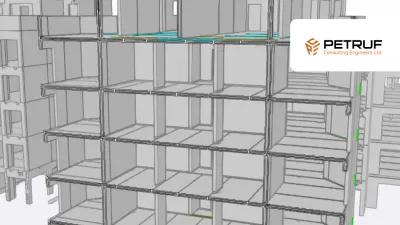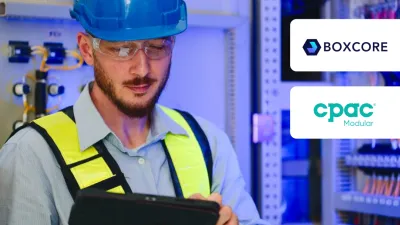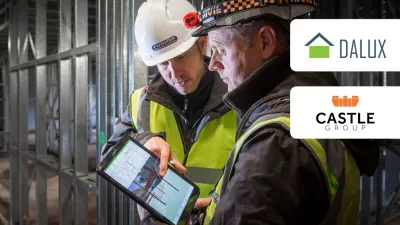ICF: Lighter, Faster, Smarter, Stronger
Insulated Concrete Form (ICF) offers tremendous opportunities for increasing the scale and rate of residential and commercial developments in Ireland. Hear from builders across the country that have adapted to using ICF in their building projects and swear by the technical advancement, sustainability and speed of installation of ICF building solutions.
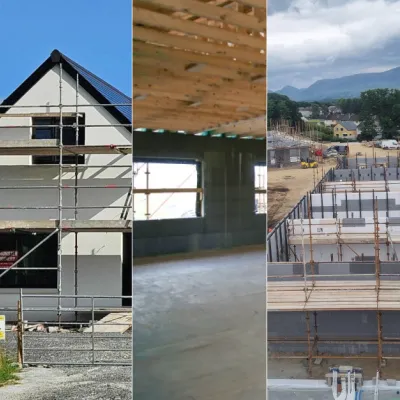
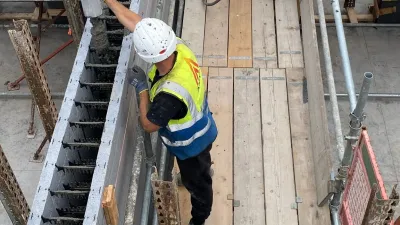
Traditional block laying is one the of the longest-standing forms of building in human history. But Modern Methods of Construction (MMC) offers a new option for building with concrete – Insulated Concrete Forms (ICF).
ICF systems are assembled from three components: blocks made from expanded polystyrene (EPS) foam, metal connectors, and concrete. The blocks, assembled from two connected EPS boards, are stacked and fixed in place via a raised surface that clicks together and is sealed with a foam adhesive. After the blocks have been fitted together, concrete is poured into the central cavity and cured to give a final structure.
ICF has in-built insulation and soundproofing, is lighter than concrete blocks, and is moisture resistant, to highlight a few benefits of this innovative material. Indeed, ICF blockwork is quickly becoming a preferred way of building for many Irish companies. The ease of transporting and installing ICF systems, with the right training, is the reason many construction professionals (particularly Carpentry Technicians) adopt it.
Eco Wall Construction & ICF, operating out of Ireland’s southeast, is led by directors Paddy Connick and James Keogh. Both are carpenters by trade and have years of experience working with ICF and delivering large-scale residential developments across the country. But, as James tells it, it was by chance the pair got together at all.
“I was foreman on an ICF project in 2022. I had experience with ICF going back a few years, but didn’t have the resources to start my own business. I met Paddy onsite – he had just moved home from Australia and was looking to get into something himself. We became friends and both saw the potential in working with ICF. So, Paddy said to me ‘You get the jobs, I’ll provide the resources’. I’m confident in saying we are now among the best ICF builders in the country.”
Director, Eco Wall Construction & ICF
James was first introduced to ICF while working on a project in Vancouver, Canada. After returning to Ireland to work as a carpenter, he chanced upon ICF again while working as a Site Assembly Operative on a project. From there, he was convinced of the benefits of using the building material.
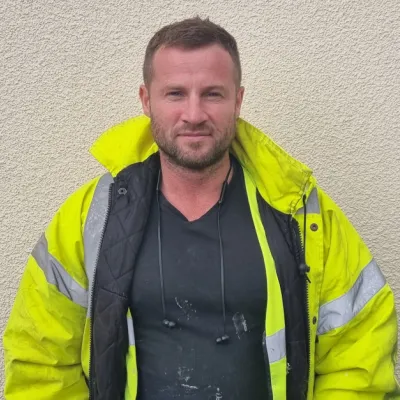
“I wanted to learn as much as I could about ICF, so I contacted Seamus Kavanagh, who was then at Amvic ICF, and I started a sort of apprenticeship with him to learn about their ICF systems. I worked on a few projects with Amvic, and then I realised there were simply not enough people installing ICF in Ireland. I wanted to pass on what I’d learned, so I became a trainer for another Irish operator, Castleforms. It’s still a small niche in the construction sector, but I was happy to help a lot of people that are now installing ICF across the country.”
Director, Eco Wall Construction & ICF
Patrick Daly, Director at Daly’s Construction, is another construction professional who got into using ICF around the same time as James and has never looked back.
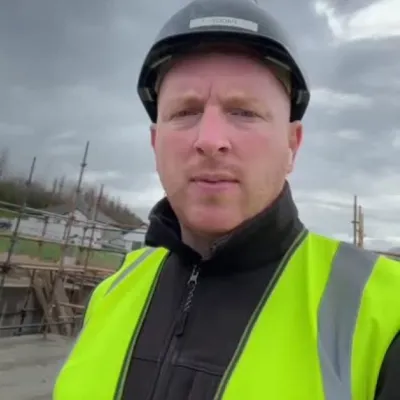
“I started working on building sites when I was just 15, but I only worked with ICF for the first time in 2017. I was really impressed. The systems are lightweight, brilliant for insulation and thermal efficiency, and are easy on the body. I first contacted Seamus Kavanagh, with Amvic ICF, to learn more about it. I then started small-scale developments and have grown over the years, and now I work with around 30 certified installers operating on projects across Ireland.”
Director, Daly’s Construction
One such installer is Stephen Quinn of Quinn ICF & Construction. Another former carpenter, Stephen was looking at options to build a house in his native Co. Monaghan. After researching ICF, he contacted Amvic and was convinced ICF was the way to go.
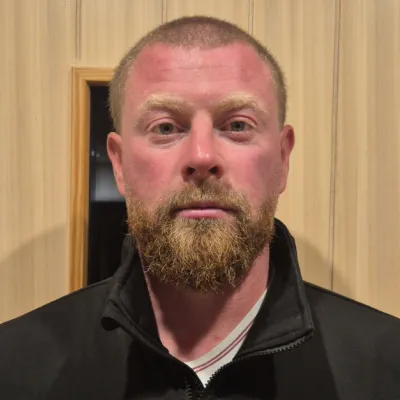
“I kind of knew ICF was around in Ireland, but I thought it was more of a US thing. It only took me building my own house with ICF for me to be fully sold on it. I can feel the benefits every day – the house is so well insulated. In fact, it only costs me around €2,200 per year in heating bills for my 3,000 square foot house.”
Installer, Quinn ICF & Construction
Stephen has the unique perspective of appreciating ICF as a homeowner and a builder; “the quick project timelines, the reduced waste, the labour efficiency is just amazing.”
Another ICF installer, Kieran Doddy of Eco Wall, can also speak to these benefits:
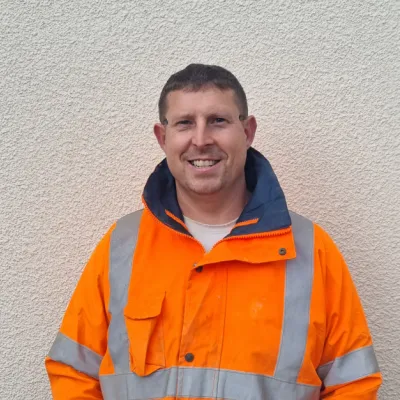
“One of the benefits of ICF is that, while it’s a sophisticated system, it’s not too complex if you have the right trainer. My learning as an ICF installer has come from shadowing others onsite and just going into the technical details of how ICF works. That’s not even to mention how easy ICF is to work with. There is no heavy lifting and the technical drawings I need to interpret are easy to follow.”
Installer, Eco Wall
For Kieran, moving to work with ICF was a step to improve his career. Kieran was working as an Environmental Field Technician near his hometown of Killarney, Co. Kerry when he first heard of ICF. The role “required a lot of driving and I wanted more hands-on work”, and so, when a friend recommended ICF, Kieran jumped at the chance.
For Kieran, moving to work with ICF was a step to improve his career. Kieran was working as an Environmental Field Technician near his hometown of Killarney, Co. Kerry when he first heard of ICF. The role “required a lot of driving and I wanted more hands-on work”, and so, when a friend recommended ICF, Kieran jumped at the chance.
Installer, Eco Wall
The work-life balance that comes from working with ICF is also a major point of appeal:
“Because ICF is quicker to install and not as hard on the body, I can better plan time off to be with my daughter and be flexible around her childcare needs.”
Installer, Eco Wall
Stephen also relishes building with ICF, from a more strategic perspective.
“Using ICF means I can plan and budget my jobs better, so I can take a day when needed to help care for my children. And, as ICF becomes more popular, I am hoping that I can just work on developments locally, cut down on travel time.”
Installer, Quinn ICF & Construction
With clear benefits for both builders and buyers alike, ICF is rapidly becoming a popular option for residential and commercial development projects alike.
For John McAndrew, installer for Mayo-based ICF company Westtherm Construction, ICF was the catalyst for a return to the building industry. Initially training as a carpenter, he then studied Construction Management at GMIT (now Atlantic Technological University) where he first encountered the concept of MMC. After a stint in Germany shadowing companies building to Passivhaus standards, he returned to Ireland.
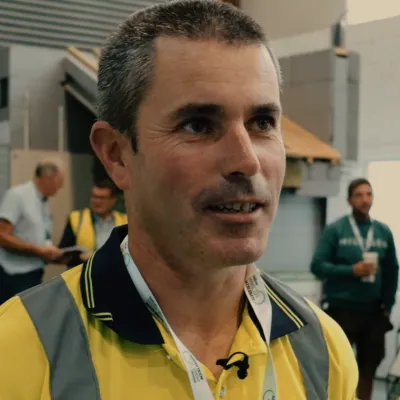
“When I came back, I couldn’t find a suitable role. So, I went into working in a factory. I was at that for years before I came across ICF and, honestly, I was blown away. I didn’t know if I would ever come back to construction, but ICF convinced me there was an easy way to build warmer, better insulated houses.”
Installer, Westtherm Construction
He started working with Westtherm earlier this year and was brought up to speed on how ICF works and how to install it by other installers, from all kinds of backgrounds:
“We have a lot of carpenters and even a lorry driver now installing ICF! It’s such an easy-to-install system, with the right training, and so energy efficient. It’s definitely the way to go for building houses, particularly in the West of Ireland.”
Installer, Westtherm Construction
However, despite the seeming simplicity of installing ICF systems, Patrick Daly is at pains to reinforce the technical skill that goes into working with the material.
“Just because it looks like Lego doesn’t mean it’s child’s play. If you don’t respect the complexities of the system, you’ll run into problems. Formal training in ICF could be more regulated, to ensure installers have the proper know-how to use it. But once that point is addressed, it’s simply really. More ICF means more units being built annually which means more housing.”
Director, Daly’s Construction
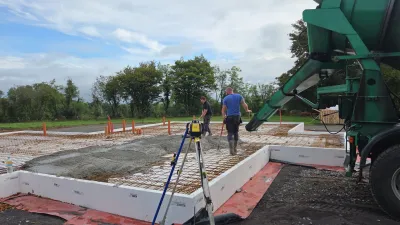
James Keogh echoes this point, saying construction professionals interested in ICF should work with a certified installer until they are competent in the trade themselves.
All signs point to ICF being one of the most viable options for building Ireland’s future generation of housing, schools, hospitals, and commercial infrastructure. It’s a material that, despite being available for decades, has only truly begun to capture the imagination of construction professionals in recent years. James Keogh offered his final thoughts on how ICF could be the solution the Irish construction industry needs.
“My uncle was an old-school block layer, and he thought highly of the traditional way of doing things, long after he retired. He was sceptical about me building my house with ICF when I was starting out. He watched me build my house in just seven days. After he saw how streamlined it was, and how comfortable and warm the house was once we had moved in, his mind was totally changed.”
Director, Eco Wall Construction & ICF
